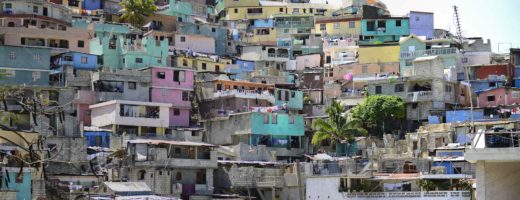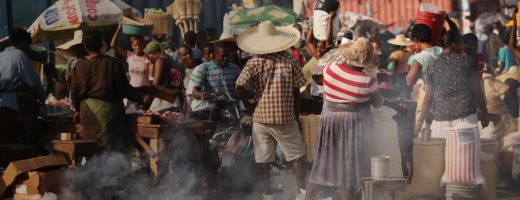As LGBT community becomes more visible, anti-gay violence rises, too. By Allyn Gaestel for Al Jazeera America November 8, 2014 Source: http://projects.aljazeera.com/2014/haiti-lgbt/ (Note: see original story for more photos) Port-au-Prince, Haiti The courtyard, tucked off a quiet road here and ringed by mango trees heavy with immature green fruit, was bedecked with a rainbow
Homosexuality is legal in Haiti, however homosexuals often face persecution and discrimination similar to most of Latin America and the Caribbean. Although homosexuality is technically legal, there are no laws in Haiti protecting LGBT people from these types of mistreatment. There is no recognition of same-sex marriage, and the topic has not surfaced in serious political discussion at the national level. The major presence of AIDS/HIV, the prevalence of poverty in, and the political and social influence wielded by the Roman Catholic Church in the Haitian population is a major factor to take into account for the LGBT minority in the country. There is no obvious or outstanding LGBT life in the country. The LGBT minority, as a result of income disparities in the country, is divided between the rich gays, lesbians and bisexuals (often in positions as NGO and UN aid workers, businesspeople, artisans, and government officials, usually consisting of whites and mulattoes) who live in such areas as Petionville (where they are a minority) and the urban poor LGBTs who live in the most desperately-poor areas of the country. They are also in the closet most of the time, although the only area that accepts an LGBT identity without discrimination is the voodoo ceremony; Voodoo, as a spirituality, possesses very little discrimination against gays, and gay participants in voodoo ceremonies are common.

Haiti – Port au Prince
Haiti occupies the island of Hispaniola, along with the Dominican Republic, in the Caribbean The total area of Haiti is 27,750 square kilometres (10,714 sq mi) and its capital is Port-au-Prince. Haiti’s regional, historical, and ethnolinguistic position is unique for several reasons. It was the first post-colonial independent black-led nation in the world, as well
Haiti – Jacmel & Port-au-Prince
Haiti occupies the island of Hispaniola, along with the Dominican Republic, in the Caribbean The total area of Haiti is 27,750 square kilometres (10,714 sq mi) and its capital is Port-au-Prince. Jacmel is a serene port town with an estimated population of 40,000 and growing. The city has not changed much since the late 19th


